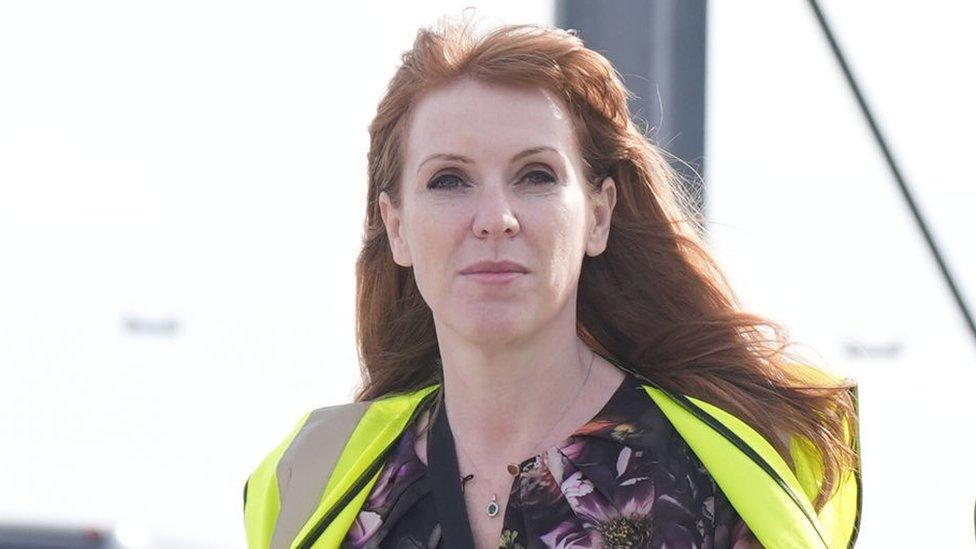A simple guide to the Angela Rayner house row
- Published

Labour's deputy leader Angela Rayner will face no police action over her past council house sale after months of questions about her living arrangements before she became an MP.
Police in Manchester looked into whether Ms Rayner paid the correct tax on a house sale, and if she was registered to vote at the right address.
But she was not found to have committed a criminal offence.
The row sparked weeks of unhelpful headlines for the MP, who promised to step down if she was found to have broken the law.
How did this begin?
Questions about Ms Rayner's living arrangements were sparked by claims in an unauthorised biography of her, written by Tory peer Lord Ashcroft, which was published in March.
She bought her former council house in Vicarage Road, Stockport under the right-to-buy scheme in 2007, eight years before becoming MP for Ashton-under-Lyne, in Greater Manchester.
Following her marriage in 2010, she sold the property for £48,500 more than she paid for it.
She initially said she didn't pay Capital Gains Tax (CGT) on the profit, because, like the "majority of ordinary people who sell their own homes," it was "my home and the only one I owned".
Those selling their "main residence" typically don't have to pay the tax.
But married couples and civil couples can normally only count one property as their main home for CGT purposes, prompting questions over whether she should have paid some tax.
What has she said?
Ms Rayner has said she wasn't aware of this tax rule when she sold the house, adding she "didn't have an accountant" at the time, and did not get specific advice on the issue.
It is understood, however, that after the row broke out she took separate expert tax and legal advice, including on the CGT issue and the rules for married couples.
She said the advice she received was "categoric" that she didn't owe any tax on her profit from the sale.
However, she did not publish the advice on privacy grounds.
The rules in this area are complicated, with various exemptions, including when the cost of refurbishment on a property can lower the amount owed.
Prior to the findings of the investigation some tax experts estimated she may owe up to about £3,500 in CGT in the worst case scenario - but also said she may owe nothing at all.
Where was she living?
The tax question prompted further questions over whether Ms Rayner registered to vote at the correct address.
Eligible voters are required to join the electoral roll, which as well as registering people to vote is also used for things like credit checks and asking people to sit on court juries.
It is an offence to give "false information" when joining the roll.
She was reportedly registered at the house she sold, in Vicarage Road in Stockport, Greater Manchester, until she sold it in 2015.
But she appears to have given two different addresses when she re-registered the births of two of her children in 2010 following her marriage to Mark Rayner, listing her then-husband's home on Lowndes Lane in the town.
A Labour spokesperson said Ms Rayner spent time at her husband's house after their marriage, but "the house she owned remained her main home".
Where do the police fit in?
Greater Manchester Police (GMP) launched an investigation in April into whether "any offences have been committed", following a request from Conservative deputy chairman James Daly, who represents nearby Bury North West.
The GMP had initially decided not to investigate, but it reversed that decision following a "reassessment" of information Mr Daly had provided.
In media interviews given since the investigation was launched, Mr Daly had not set out his allegations in any detail, adding he didn't want to discuss them publicly to give police "time and space to investigate".
The force did not say exactly what it was investigating at the time, with its chief constable saying no "running commentary" would be given on a live probe.
The investigation concluded in May, with GMP saying it would not take any further police action but had referred the investigation to HMRC and Stockport Council because "council tax and personal tax do not fall into the jurisdiction of policing".
HMRC said Ms Rayner did not owe any capital gains tax and it would not take any further action, according to a Labour source.
Stockport Council, too, said upon review of the matter it would not be pursuing police action against Ms Rayner.
What have Labour said?
Ms Rayner welcomed the conclusion of the police investigation and accused the Conservative Party of "desperate tactics" to distract the public from "their dire record" during election campaigns.
Labour leader Sir Keir Starmer backed his deputy throughout the investigation, saying he was "fully confident" she had not broken any rules.
He hadn't himself seen the legal advice she has received, he said, although members of his team had.
And he accused Prime Minister Rishi Sunak of "smearing a working-class woman," who had called on the Labour leader to read the advice during a feisty Prime Minister's Questions while the police investigation was ongoing.
A Labour party spokesperson said the conclusion of the police investigation "draws a line under the matter", and that Ms Rayner had followed advice correctly.
Related topics
- Published14 April 2024

- Published13 April 2024
